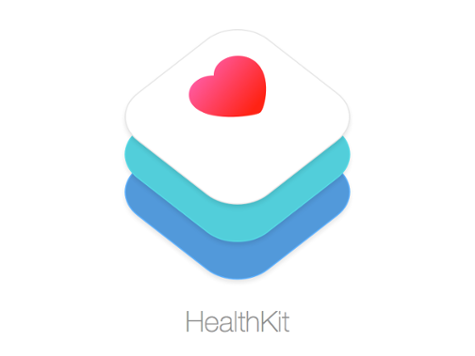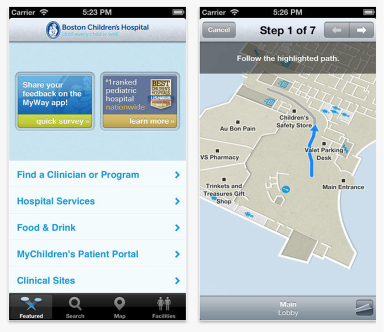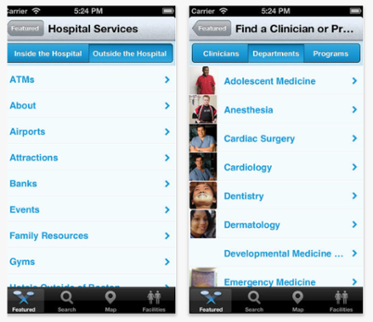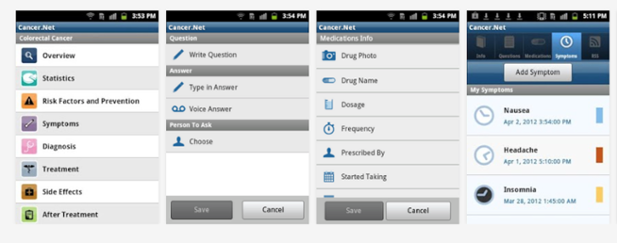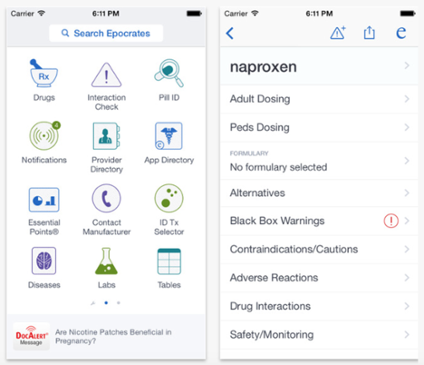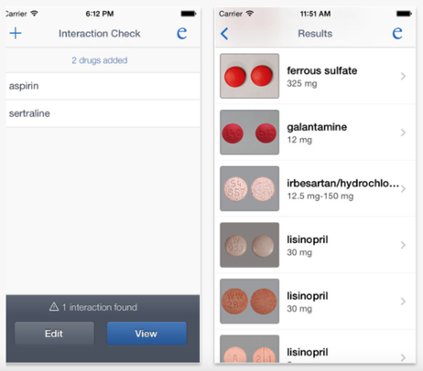Historically, healthcare has benefitted from a wide variety of innovation and advancements – from surgical anesthetic and antisepsis to clean water to antibiotics and antivirals to vaccines to X-ray technology. Today, mobile healthcare is changing the face of the industry.
The first organ – a kidney – was transplanted in 1954. The ability to put patients on heart-lung bypass (the first operation of which happened in Philadelphia in 1953 by Dr. John H. Gibbon, Jr.) gave patients suffering from critical heart disease hope once surgeons had the ability to operate on the heart for more than a few minutes at a time. This advancement has dramatically impacted my life – my two-and-a-half-year-old daughter Sasha was born with a congenital heart defect that required open-heart surgery at six months of age. Without the possibility of that surgery, her outlook would have been significantly different.
Today, many digital innovations are making it possible for patients to take an active part in managing their health. We can access our electronic medical records and make appointments online. We can save all of our insurance information and get doctor referrals via electronic patient portals. And similar to how the conversation around brand engagement with consumers has changed since the dawn of social media, the conversation around ownership of health care is shifting from caregivers to patients. Technology is giving patients greater access to information.
Now mobile health technology has evolved even further, allowing caregivers to remotely and continuously monitor their patients’ vitals – blood pressure readings, temperature, oxygen saturation, brain waves, glucose, breathing…etc. When Sasha was in the CICU and then in the step-down unit at Children’s Healthcare of Atlanta at Eggleston, they continuously monitored her vitals via telemetry, a wireless system that continually fed her heart rate and rhythm to the staff. With the advent of the smartphone, mobile apps started popping up that can do these things as well. Wearables are furthering this technology for both fitness and health reasons.
In March, with the launch of iOS 8, Apple launched “Health,” an app that tracks your vitals, caloric intake, emergency contacts and provides a medical ID including prescription allergies and reactions. Health, if allowed, can share your vitals with your healthcare provider, or enable your nutrition and fitness apps to talk to each other. The more information put in the hands of the consumer, the more informed decisions each of us can make concerning health issues. Along with the launch of Health, Apple released HealthKit, a new tool to developers that helps improve the performance of health and fitness apps.
For research purposes (I think this is way cool!), Apple pushed out ResearchKit, an open source software framework created to help medical researchers get new trial entrants. Immediately after the announcement, one Stanford University cardiovascular trial had 11,000 sign-ups!
While it’s great that researchers get volunteers so quickly, there is also concern about the types of patients signing up. An app can’t vet a patient’s qualifications to see if they are the right type of patient for the trial the way a doctor would. Still, it will be interesting to see how this turns out and if it leads to other ways of facilitating trials.
Best-in-class mobile health apps for patients
What are the kinds of features patients look for in a mobile app – especially patients who must experience a hospital stay? What can hospitals do to improve an inpatient experience?
Access to legal documents, insurance information and having the ability to download lab results and medical records via a mobile app is significantly important for today’s patient who must endure a hospital stay.
Large hospitals probably want to consider navigation information – how do I get around the hospital? Where is check-in? Where is the cafeteria? Are there elevator banks on my floor? Where is the gift shop? What about waiting rooms for family members? Obviously, the app shouldn’t provide sensitive, non-public information like labs, surgical units, etc. But knowing where the ICU is would be helpful for the patient’s family.
Answers to common questions such as food service – can I order room service, is there a mobile menu, can I order via the mobile app? Can my family order via the app. Easy access to comfort food during a hospital stay can do wonders to improve the inpatient experience. Answers to whether or not there is an on-site chaplain or social worker or counselor available can be very helpful for families and patients enduring serious health conditions. Other information like when doctors do rounds, or what kinds of monitors are in a room can make a stay more comfortable.
Boston Children’s MyWay Mobile App is a great example of how hospitals can leverage mobile software to improve patient experiences. It’s offered on iOS and Android devices and has the following features:
- Simple step-by-step navigation throughout the entire hospital taking you from the garage to your appointment and all the stops in between like the cafeteria, an ATM, or the nearest restroom
- Find any doctor, program or service at the click of a button
- Access MyChildren’s Patient Portal, allowing you to manage your child’s appointments, securely view lab results and health records, or message your child’s clinician
- MyWay has directions to Boston Children’s parking garages, information on their rates and hours of operation and everything you need to know about nearby public transportation
- Menus, prices, information and discounts to the various food services located inside or outside the hospital
- MyWay has hours, descriptions and directions to support services within the hospital including the Center for Families, Social Work and Child Life
- MyWay’s Hospital Services feature has a quick list of nearby accommodations, activities and area conveniences arranged by location, hours of operation and price
- Information, directions and service offerings to all the local Children’s Hospital locations
- Direct access to our Facebook, Twitter and blogs, providing you with supportive advice, news, healthy tips, stories, contests and videos
For patients who don’t anticipate a hospital stay, mobile provides an excellent way to manage health care concerns, especially for those patients battling difficult diseases. The same access to legal documents such as Powers of Attorney and Living Wills and access to medical records come in handy for any patient.
Apps that provide personalized plans that complement treatment plans can help patients keep track of their nutrition goals, exercise goals, medicine schedule, doctors appointments and prescription refills. Many of them will feed a patient’s vitals back to their caregiver, keeping both parties in closer contact with each other.
Information about a patient’s condition is also incredibly useful as patients learn about their disease, about how to manage their care, about the types of doctors they will see and about the medicines they will take.
Cancer.Net (American Society of Clinical Oncology) provides a great app for patients who need to manage their treatment plans. Its features include:
- Guides on 120 types of cancer
- An interactive tool to keep track of questions to ask healthcare providers and record voice answers
- A place to save information about prescribed medications, including photos of labels and bottles (on camera-enabled devices)
- A symptom tracker to record the time and severity of symptoms and side effects
- A section featuring the latest videos, podcasts, and Cancer.Net Feature Articles
- Automatically updated content
- Optional passcode lock
- Optional iCloud backup for the questions, medications and symptoms entered into Cancer.Net Mobile (on iCloud-enabled iOS devices)
Internal Apps for Healthcare
No doubt, applications that help make patients’ lives easier as they go through hospital stays or managing long-term health issues have a lot of value. But like any other company or organization, there are a lot of opportunities for mobile to increase efficiencies and improve workforce results within health systems.
Apps that allow doctors to update medical records or write patient referrals can eliminate needless paperwork and help accomplish necessary tasks while on-the-go. Apps that allow caregivers to move freely without being tethered to a workstation or a desktop client improve working conditions. Calling up a medical record at the patient’s bedside without having to go back to a desk or to a medical records department also reduces patient wait times, therefore improving the patient experience.
This article offers a list of 10 Must-Have Apps for Nurses that include references for medication, drug interaction, resources on assessing, cardiac care, etc…
This app by Epocrates is considered the “gold standard” of medical apps. It allows doctors to reference drug information and interactions, access a database of providers for consults and referrals and do quick calculations. Pretty cool.
Mobile is impacting patient health in many ways. Providers are leveraging mobile for video consultations, allowing patients to interact with their doctors via smartphone, tablet and desktop. This has incredible power to affect patients who have a very low access to care.
Many hospitals are using mobile surveys to ascertain how to improve hospital stays. Doctors’ offices are using mobile as point-of-service patient education tools. With more tools coming out to help developers meet the needs of patients and providers, we will see a lot more growth in this area.
